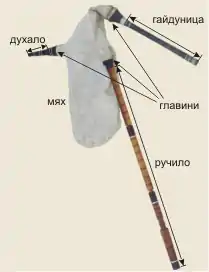гайда
Bulgarian

Овча гайда
Etymology
Wanderword probably from Ladino, cognate with modern Spanish gaita, Basque gaita, Portuguese gaita. Loaned also into Macedonian гајда (gajda), Serbo-Croatian га̑јде pl, Greek γκάιντα (gkáinta), Turkish gayda, Arabic غَيْطَة (ḡayṭa).
False cognate with native Bulgarian га́я pf (gája), га́кам pf (gákam), га́ювам impf (gájuvam, “to squawk, to caw”) (dialectal, of onomatopoeic origin) and further with Lithuanian gáida (“melody”).
Pronunciation
- IPA(key): [ˈɡajdə]
Declension
Declension of га́йда
| singular | plural | |
|---|---|---|
| indefinite | га́йда gájda |
га́йди gájdi |
| definite | га́йдата gájdata |
га́йдите gájdite |
Derived terms
- гайда́р (gajdár, “bagpipe player”)
- гайдуни́ца (gajduníca), гайдени́ца (gajdeníca, “bagpipe's chanter”)
Ukrainian
Etymology 1
Borrowed from Ottoman Turkish هایده (hayde), هایدی (haydi).
Noun
га́йда • (hájda) f inan (genitive га́йди, nominative plural га́йди, genitive plural гайд)
- a Bulgarian/Serbian/Polish bagpipe
Declension
Declension of га́йда (inan hard fem-form accent-a)
| singular | plural | |
|---|---|---|
| nominative | га́йда hájda |
га́йди hájdy |
| genitive | га́йди hájdy |
гайд hajd |
| dative | га́йді hájdi |
га́йдам hájdam |
| accusative | га́йду hájdu |
га́йди hájdy |
| instrumental | га́йдою hájdoju |
га́йдами hájdamy |
| locative | га́йді hájdi |
га́йдах hájdax |
| vocative | га́йдо hájdo |
га́йди hájdy |
Noun
га́йда • (hájda) f inan (genitive га́йди, nominative plural га́йди, genitive plural гайд)
- (historical) hide (a unit of land and tax assessment of varying size in Middle Ages England)
Declension
Declension of га́йда (inan hard fem-form accent-a)
| singular | plural | |
|---|---|---|
| nominative | га́йда hájda |
га́йди hájdy |
| genitive | га́йди hájdy |
гайд hajd |
| dative | га́йді hájdi |
га́йдам hájdam |
| accusative | га́йду hájdu |
га́йди hájdy |
| instrumental | га́йдою hájdoju |
га́йдами hájdamy |
| locative | га́йді hájdi |
га́йдах hájdax |
| vocative | га́йдо hájdo |
га́йди hájdy |
References
- Melnychuk, O. S., editor (1982), “гайда”, in Етимологічний словник української мови [Etymological Dictionary of the Ukrainian Language] (in Ukrainian), volume 1 (А – Г), Kyiv: Naukova Dumka, page 452
- Bilodid, I. K., editor (1970–1980), “гайда”, in Словник української мови: в 11 т. [Dictionary of the Ukrainian Language: in 11 vols] (in Ukrainian), Kyiv: Naukova Dumka
- Rusanivskyi, V. M., editor (2012), “гайда”, in Словник української мови: у 20 т. [Dictionary of the Ukrainian Language: in 20 vols] (in Ukrainian), volume 3 (відстава́ння – ґура́льня), Kyiv: Ukrainian Lingua-Information Fund, →ISBN
This article is issued from Wiktionary. The text is licensed under Creative Commons - Attribution - Sharealike. Additional terms may apply for the media files.